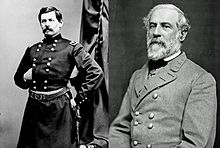Maryland Campaign
| Maryland Campaign | |||||||
|---|---|---|---|---|---|---|---|
| Part of the American Civil War | |||||||
 Union General George B. McClellan and Confederate General Robert E. Lee, the principal commanders of the Campaign. |
|||||||
|
|||||||
| Belligerents | |||||||
|
|
|
||||||
| Commanders and leaders | |||||||
| George B. McClellan | Robert E. Lee | ||||||
| Units involved | |||||||
| Army of the Potomac | Army of Northern Virginia | ||||||
| Strength | |||||||
| 102,234 | 55,000 | ||||||
| Casualties and losses | |||||||
|
27,940 total (2,673 killed; 11,756 wounded; 13,511 captured/missing) |
10–20,000? | ||||||
The Maryland Campaign—or Antietam Campaign—occurred September 4–20, 1862, during the American Civil War. Confederate Gen. Robert E. Lee's first invasion of the North was repulsed by the Army of the Potomac under Maj. Gen. George B. McClellan, who moved to intercept Lee and his Army of Northern Virginia and eventually attacked it near Sharpsburg, Maryland. The resulting Battle of Antietam was the bloodiest single-day battle in American history and is widely considered one of the major turning points of the war.
Following his victory in the Northern Virginia Campaign, Lee moved north with 55,000 men through the Shenandoah Valley starting on September 4, 1862. His objective was to resupply his army outside of the war-torn Virginia theater and to damage Northern morale in anticipation of the November elections. He undertook the risky maneuver of splitting his army so that he could continue north into Maryland while simultaneously capturing the Federal garrison and arsenal at Harpers Ferry. McClellan accidentally found a copy of Lee's orders to his subordinate commanders and planned to isolate and defeat the separated portions of Lee's army.
While Confederate Maj. Gen. Stonewall Jackson surrounded, bombarded, and captured Harpers Ferry (September 12–15), McClellan's army of 102,000 men attempted to move quickly through the South Mountain passes that separated him from Lee. The Battle of South Mountain on September 14 delayed McClellan's advance and allowed Lee sufficient time to concentrate most of his army at Sharpsburg. The Battle of Antietam (or Sharpsburg) on September 17 was the bloodiest day in American military history with over 22,000 casualties. Lee, outnumbered two to one, moved his defensive forces to parry each offensive blow, but McClellan never deployed all of the reserves of his army to capitalize on localized successes and destroy the Confederates. On September 18, Lee ordered a withdrawal across the Potomac and on September 19–20, fights by Lee's rear guard at Shepherdstown ended the campaign.
...
Wikipedia
